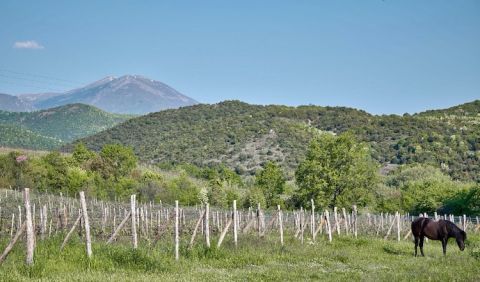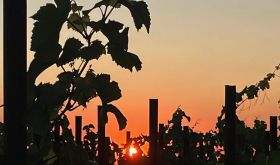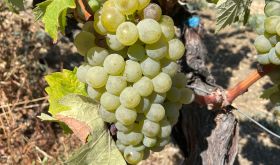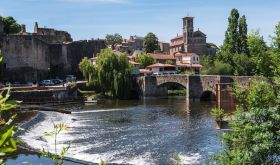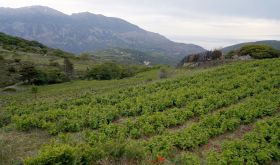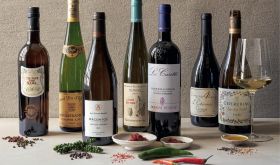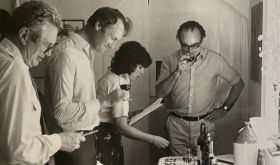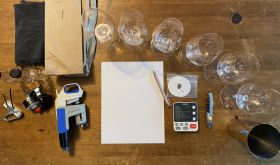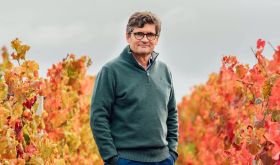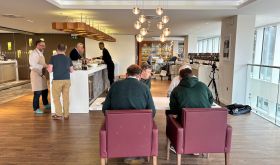Olga Antoniadou writes psychiatrist/psychotherapist, wine lover, stuck with the WSET Diploma due to Covid-19 (I will probably be an old lady by the time I manage to finish it).
Thymiopoulos Vineyards
I have this feeling of elation. I look around me, I’m with my husband, my good friends and we are walking the vineyards of the Thymiopoulos Winery in Trilofos of Naoussa. It’s late afternoon, almost dusk, and the tranquility around has embraced me. I am listening to Apostolos Thymiopoulos, our host, and as I look at him I think to myself ‘what a charming young man’. Smiling, full of energy, talkative, bursting with ideas. His eyes literally shine as he talks about the vines and his work. For a minute there I’m jealous of how happy he seems.
As we walk back to his paternal home, after tasting his wines, daylight has abandoned us. I somehow happen to fall into step with him and we get to talking about how he decided to be an oenologist and he laughs: “Good point! I know I should say something like I grew up with vineyards all around me, which is true, but in all honesty, that's all I ever wanted to be. I studied in Athens, and that was the only choice I put down for University. I wanted to work as a winemaker. In the beginning I thought I would work for other wineries, but I never did. I came home and made wine from our own grapes. I began winemaking here. My first bottling was in 2003 and that was released in 2005. Around 1500 bottles. But, it went very well, and then I started buying land, planting vines, etc. I never left”.
I smile and comment on how lucky people who know what they want are. I look across the vineyard and see a house. I ask him who lives there. “Nobody, now. My brother used to live there but we lost him, and a few months later we also lost my father”. He quickly looks away and I fleetingly glimpse the pain in his face. I shiver. My head and my thoughts are spinning. How do I manage to get so personal! I mumble something under my breath and he opens his stride to talk to the friends walking in front us. His mother is waiting for us at her door and welcomes us with sweets. We pile into her home buzzing about the lovely experience and how well her son is doing.
This was eight years ago. He must have been about 35 at the time. And his losses had taken place only five years earlier. If regeneration is what we’re talking about here, I wouldn’t know where to begin. How many people do you know who can take personal tragedy and transform it into a whirlwind motivational force that drives them forward, instead of allowing it to become a maelstrom that sucks their being into the gut of pain, and interminable grief? This man put his head down like a bull and his rage and despair evaporated into creativity. And, no. He’s not lucky. He just works very hard and doesn’t give up.
Already, at the time I first met him, he had made quite a name for himself in Greece. He had completely changed the winemaking of Xinomavro. The rather rustic, aggressive wine, that needed ages in bottle to soften its tannins and show its character, Apostolos had managed to tame. His label Earth and Sky was selling out like crazy each year. Xinomavro had suddenly somehow softened, had acquired aromas of wild berry fruit and was drinkable even in its youth. Not typical, but also quite typical as the aromas we attribute to the variety like red plum, red cherry, tomato paste and black olives had not been lost. The colour of the wine was deeper, a fuller body, the tannins were not aggressive, the acidity still there and, of course, ageing potential. Earth and Sky introduced a new way of winemaking to Naoussa, that was novel to the region. A school. They now talk of the ‘old school’ and the ‘new school’ and Apostolos founded the ‘new school’.
I have seen him on many occasions since and he always has something new to tell me about what he’s managed and what else he is thinking of doing. We spoke a few days ago and I asked him how his father had reacted to the changes he proposed. “My father was very open minded and he believed in the potential of Xinomavro. He agreed to everything without second thought. He wanted the variety explored. You know, he was a grower. He always farmed organically despite not being paid more, because he felt that the quality of his fruit was better. When the region was given enhancing varieties he laughed and never planted a single one. What was the point of planting other varieties? He always said that Xinomavro is what we should focus on”.
So, with his father’s blessing he started his changes. Quite a few were made.
“Soil health to me was crucial. You need microorganisms and earthworms in the soil to replenish it, air it and create compost. I read much about the role of earthworms and their significance. Also, wild growth between the vines and rows provides nutrients. In a dry country, like ours, it may compete with the vines for water, but it regulates temperature and we managed to not have our grapes sunburn in the summer. I also don’t de-leaf much and I don’t de-stem. I increased plant density from 250 to 400 or even 1200 vines/ha, depending on the fertility, soils, altitude and slopes of particular plots. Eg. I have soils that are clay loam, I have others which are granite and schist. I have vineyards at 150-200m around Trilofos, I have Fitia at 400-500m, I have others in a ridge. Alta comes from the high altitude vineyards, Earth and Sky from old vineyards, Kayafas has much clay, Aftorizo (own rooted) has schist, Vrana Petra black granite (there’s an old granite quarry near the vines). I’m also experimenting with different training and pruning methods. I have both single and double Royat, Guyot and Goblets”.
He farms organically and borrows ideas from biodynamic farming. “I take the vines to their limits. I stress them, but I’m there watching them all the time. Each vine is a different individual. Almost like being around different people. Depending on the vintage I may not intervene at all. I try to help the vines find their own balance. The idea is to get good quality fruit with the least possible intervention”. He currently owns 42ha in Naoussa and has 80ha contracted, in Rapsani he owns 7ha and has another 2ha contracted and in Santorini all are contracted. He saved some old vines in Rapsani that were about to be pulled out. 70 yr old vines that had been abandoned. “They’re on slopes and cliffs. They were food for goats”. His plans are to expand to Goumenissa and Amyndeo.
“What about your winemaking? What do you do differently?” I ask.
“My winemaking is very traditional red winemaking with maceration on the skins. I vinify the different plots separately and use different methods and times for the different plots and the different vintages. I don’t have a specific protocol that I repeat each year in exactly the same way. I try to respect the needs of each vintage. All my ferments are with ambient yeast, with all the risk this involves, I use some whole bunches depending on the vintage, I never use microogygenation, and I have been using all types of vats stainless steel, oak barrels, cement and amphorae. The size of the oak barrels vary from 500-1000-2000-5000lt, all old use”. I ask him if he looks up to other winemakers and he says that he admires the work of Roumier in Burgundy and Olivier Humbrecht in Alsace.
He tells me that he has started a grower group in the community, where growers gather and exchange ideas about their viticultural techniques. He hopes that this will help evolution in his region. I wonder to myself where on earth he finds time for all of these things, because much of the promotion he does himself. He also just managed to complete the winery he had started almost ten years ago and takes great pride in the fact that now he has more space for his vats, his tastings, offices and so forth. When I had first visited, the building was standing, and a cobblestone wall was being built around the winery using materials from the vineyards. When I visited the winery a couple of years later it was still in the process of being built. This is because whatever money he makes he tries to invest into buying land, vineyard materials, winemaking equipment, and there was never anything left for the fancy part.
I ask him about his sales. “You know France was the country that opened doors for me in 2005. France paved the way. With all the competition around, it’s imperative that you deliver a product that makes an impression. Nowadays, I have loyal clients, who know my wines very well. I also export to the UK, USA, Canada, Japan, Australia and Spain”.
The more I talk to him the more I feel I admire this young man. He never bragged or became too big for his boots. He conquered his place with his work and patience. I like people with principles. I can see why he was popular at school, and why he is generally well liked. I tease him about his wife, Eleftheria, who is also an oenologist, with years of experience at the best wine lab and he says: “When it comes to deciding, I never hesitate. I stole her away; it was seizure”. They have a lovely daughter, Melina, who is now 5yrs old and just dropping her name makes his eyes sparkle”.
There are so many winemakers around the world who are working wonders, but there are few who have the charisma of Apostolos. He twisted his own fate and partly that of a whole region.
All photographs are courtesy of Apostolos Thymiopoulos.


